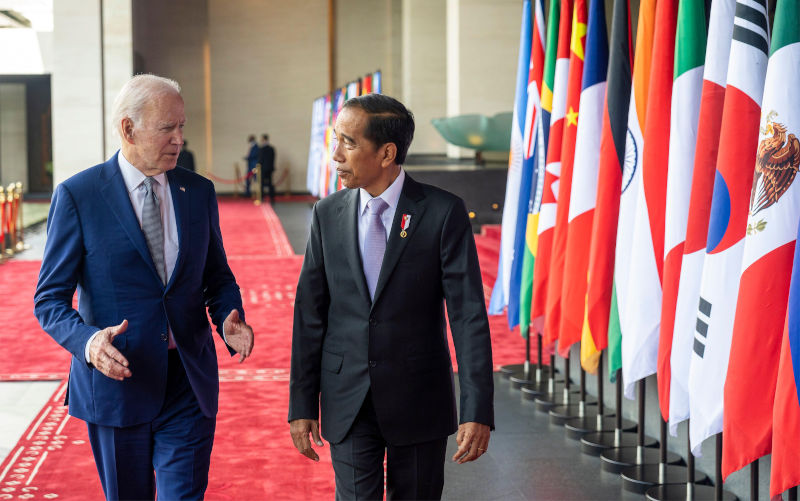Indonesia could help bring China and US back from the brink
July 4, 2023
Widodo visit: Indonesias approach to regional security needs to be more than than fence-sitting.
The visit to Australia this week of President Joko Widodo of Indonesia known as Jokowi should give us pause to reflect on how we and Indonesia stand with each other and what the future holds.
Truth be told, our relationship with Indonesia has become a mite boring. Never mind. In this business boring is good.
Until the past few years, much of the political energy each country had for the other was spent on crisis management.
We watched Indonesias internal tribulations in the 1960s with alarm. From the 70s until the 90s, Indonesias actions in East Timor caused periodic eruptions. Then there were the terrorist incidents targeting Australians early in the century, particularly the Bali bombings in 2002.
And until a few years ago the sheer difference in our systems involved lengthy ruptures as when news broke in 2013 that Australia had tapped the phone of then-president Susilo Bambang Yudhoyono, his wife and members of his cabinet; or because of consular issues, mainly connected with Bali of which the Andrew Chan and Myuran Sukumaran executions in 2015 were the most prominent.
This welcome monotony in the relationship owes something to serendipity, and perhaps something to a greater maturity of outlook in both nations. Jokowis essential pragmatism may also be a factor. He is the only Indonesian president since independence with a business background. If this lack of fireworks continues, we should be diverted even less by the need for crisis management with Indonesia and be able to focus more on what we want from the relationship.
The most recent Lowy Power Index projects Indonesia to be the worlds fifth-biggest economy in PPP terms by 2030. Its middle class is now over 50 million.
We must heed these things. As of 2021, each was only the others 13th-largest trading partners. Indonesia ranked 27th as a destination for Australian foreign investment. Indonesia was the 38th-largest source of foreign investment for Australia.
Australian business has always been risk-averse about Indonesia. But other countries make money there. We need to do something about it, partly given the openings created by the 2021 Indonesia-Australia Comprehensive Economic Partnership Agreement, opportunities exist across the board but particularly in healthcare, food and agriculture, education, and resources and energy services.
Then there is the role we would like to see Indonesia play in terms of regional security.
Indonesia has tended to be first among equals in South-East Asia, particularly when Suhartos authority was at his height and the gifted Ali Alatas was foreign minister.
Historically, Indonesia has not always used its natural agency as a big country with an intelligent leadership as effectively as it might. Its foreign policy has sometimes been clothed in the rhetoric of nonalignment or subsumed under the carapace of ASEAN solidarity. It has even been called a small, big country for having fallen short of its promise in the international domain.
Although Jokowi is known as a domestic president, he has done better than that.
He has displayed gumption in protecting Indonesias fishing interests from Chinese incursions off the Natuna islands.
In an ASEAN summit in 2019, he was a prime mover in asserting ASEANs role in maintaining peace and stability in the region in the face of increased competition between the United States and China.
As host of the G20 summit in Bali in 2022, Jokowi used his role to facilitate a meeting between Presidents Joe Biden and Xi Jinping. He also brokered a concluding G20 statement on Ukraine despite obvious differences of approach in the group.
The question now when the future of Asia is more at issue than at any time since the Pacific War is what role Indonesia might play on regional security issues.
Many Indonesians do not much like China. They see the American presence as a counterweight to it. But they acknowledge Chinas rise and want its economic input.
Indonesia has accepted the Quad and AUKUS as facts of life but with qualifications. Only last week, Jokowi urged these groupings to be supporters of efforts to build peace and stability in the region, espousing engagement not containment.
Indonesia will never be a quasi-ally of Australias and we should not seek that.
But we need of Indonesia more than fence-sitting neutrality. We need its heft. We need Indonesia to use that heft to work with its fellow South-East Asians to bring China and America back from the brink. This will involve more than engagement. It will involve activism. We need it as a strong pole in a multipolar region.
If Jokowi and his successors take such an approach, Indonesia would no longer be a small, big country, but a large, big one. In past generations, Australia might have regarded such a prospect with dismay. Today, we should welcome it.
John McCarthy is a former ambassador to Vietnam, the United States, Indonesia and Japan, a high commissioner to India, and a senior adviser to Asialink.
Original article published in the Australian Financial Review on 2 July, 2023
